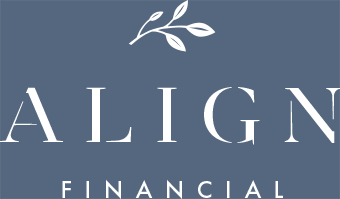Success is a few simple disciplines, practiced every day; while failure is simply a few errors in judgment, repeated every day.
—Jim Rohn
As I look back on 2020, I’m reminded how truly unpredictable life can be. Last January, no one could have imagined a pandemic would upend our daily lives, not to mention the social and political unrest we’d experience throughout the year.
Still, the new year always gives us the opportunity for a fresh start. And while we have no idea what 2021 has in store for us, we can set ourselves up for success nonetheless by setting inspiring financial goals, developing better habits, and making decisions that are aligned with the life and future we envision for ourselves.
Here at Align Financial, we believe being more intentional with your money–that is, becoming conscious and aware of your financial habits–will ultimately get you closer to the life you want. That’s why financial goal-setting is one of the first steps in our financial planning process. When you know what you’re working towards, you can map out a course to get there.
And here’s the good news: financial success doesn’t require you to change your entire lifestyle. You simply need to be clear about your goals and take small, intentional steps to get closer to them everyday.
So, to help you live your best financial life in 2021, I’m sharing three financial goal-setting practices I use to set myself and my clients up for success.
Financial Goal-Setting Practice #1: Review Last Year’s Financial Activity
The only way to set realistic financial goals is to have a clear understanding of your current financial picture. Just as most personal trainers measure BMI, resting heart rate, and other vital stats before designing a new fitness program for their clients, you must also establish a baseline before developing a new financial plan.
To do this, start by reviewing last year’s financial activity, including your income and spending and saving habits.
Spending
If you have a budget, you’re already ahead of the game! How well did you stick to it last year? If you don’t keep a budget (and perhaps that’s one of this year’s goals), what did you spend your money on? Understanding where your money goes allows you to course-correct if you need to be more disciplined going forward.
Savings
Next, review how much you were able to save last year. If you have an employer-sponsored retirement plan like a 401(k), how much did you contribute? Maybe you contributed to an individual retirement account or built up your emergency fund. This is all important information to have when setting goals for 2021.
Earnings
Finally, calculate last year’s earnings–income from your job, investments, or other sources. Do you expect your income to look similar this year? This may be difficult to assess if you work for yourself or most of your income comes from investments and other sources, but do your best to come up with a good estimate for 2021. Changes to your expected income, positive or negative, will also impact the goals you set this year.
Once you’ve gathered all the information you need, be sure to note what you did well in 2020. If you saved more than you planned, paid down debt, or finally purchased your dream home, acknowledge your wins. This will help you keep the momentum going in 2021. In addition, be honest with yourself about where you can improve. None of us is perfect when it comes to our finances, but it’s self-awareness that helps right the ship.
Financial Goal-Setting Practice #2: Set Your Top 3 Goals for 2021
Now that you have a better understanding of your personal finances, you can move on to the fun part–goal-setting. I often leverage the SMART Goal concept when setting goals to ensure each one is clear and reachable.
If you’re not familiar, SMART is an acronym for Specific, Measurable, Achievable, Relevant, and Time-Bound. For example, “I want to increase my emergency fund by $10,000 by December 31, 2021” is a much better goal than, “I want to save more this year,” based on this concept.
So, with that in mind, you can start to identify financial goals that make sense for you, based on your current financial situation. Here are some broad categories to help get your gears turning.
Budgeting
Whether you want to be more disciplined about your spending or need a plan to keep you honest, a budget is a great place to start and helps with many areas of your overall financial plan.
Debt
Do you have credit card debt or student loans hanging over your head? Set a goal to pay down a certain amount each month and reduce your debt balance by the end of the year.
Savings
Are you as prepared as you’d like to be if you suddenly lost your job or had an unexpected expense? Not to mention, you may be thinking about retirement in the near future. Setting a savings goal can help you feel better about the future, whatever it holds.
Planning
Not all financial goals require cash flow activity. Perhaps you’ve been procrastinating on basic estate planning for one reason or another. If so, your goal could simply be to engage an attorney and finally knock out your necessary estate planning documents this year.
No matter your goals, keep it simple. I usually find three goals for the year ahead is manageable and effective. Try to set one very achievable goal, one reasonably achievable goal, and one reach goal. As you start to build momentum with smaller goals, the larger goals may not seem so out of reach.
Finally, be sure to write your goals down! One popular goal-setting study found that you’re 42 percent more likely to reach your goals if you write them down. In addition, keep them visible so your goals are always front-of-mind.
Financial Goal-Setting Practice #3: Make a Plan and Automate What You Can
Let’s say one of your life goals is to run a marathon, but the most you’ve run up to this point is a 5K. If you keep following the same eating habits and running schedule you’ve always kept to, it’s unlikely you’ll have enough stamina to run 26.2 miles on race day. To reach your goal, you’ll have to change your daily habits and practices–for example, eating cleaner or more nutritious foods and increasing the distance you run each week.
The same is true for financial goal-setting. You won’t reach your goals if you don’t change your habits. So, the last step is to come up with a plan to reach each of your three goals.
Here are a few tricks I’ve found that can greatly increase your chances of success.
Aim Small
This sounds counterintuitive, but our goals don’t have to be the massive hurdles we make them out to be in our heads. Oftentimes, we don’t have to change our daily habits dramatically to see big results. In fact, in his book Atomic Habits, James Clear highlights that if you can improve your habits by 1 percent each day for one year, you’ll end up thirty-seven times better by the end of the year. So, aim for small, consistent improvements to your money habits, and you may be surprised by how easy it is to reach your goals this year.
Automate, Automate, Automate
Have you ever heard of the term decision fatigue? Basically, the more decisions we’re forced to make each day, the lower quality our decisions will be as the day goes on. This is why many successful entrepreneurs wear the same thing every day. By committing to a uniform, they eliminate the first decision most of us make every day of our lives–what to wear–thus keeping their minds free to make more important decisions throughout the day.
Similarly, you’ll improve your chances of success if you automate as many financial decisions as you can. Just like eating a healthy dinner at the end of a long day is unlikely to happen if you haven’t prepared your meal in advance, making good financial decisions is much more difficult when you have to think about them constantly. In other words, when it comes to paying down debt or contributing to your savings, you’re much more likely to do it if you put it on autopilot.
Celebrate Your Wins
Lastly, financial goal-setting and planning doesn’t mean you can’t have any fun or occasionally splurge on yourself and loved ones. When you hit one of your goals, mark the occasion with a reward or celebration. Go out to a nice dinner with your family (or order in), or give yourself an afternoon off to read a book and relax. Honoring your achievements will keep you energized throughout the year, so you can stick to the new habits you’ve developed.
Planning for the Year Ahead
We at Align Financial wish you happiness and success in 2021. If you’re inspired to take your financial goal-setting exercise a step further and develop a comprehensive financial plan this year, please get in touch. We’d be happy to help.













